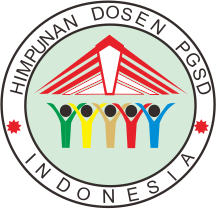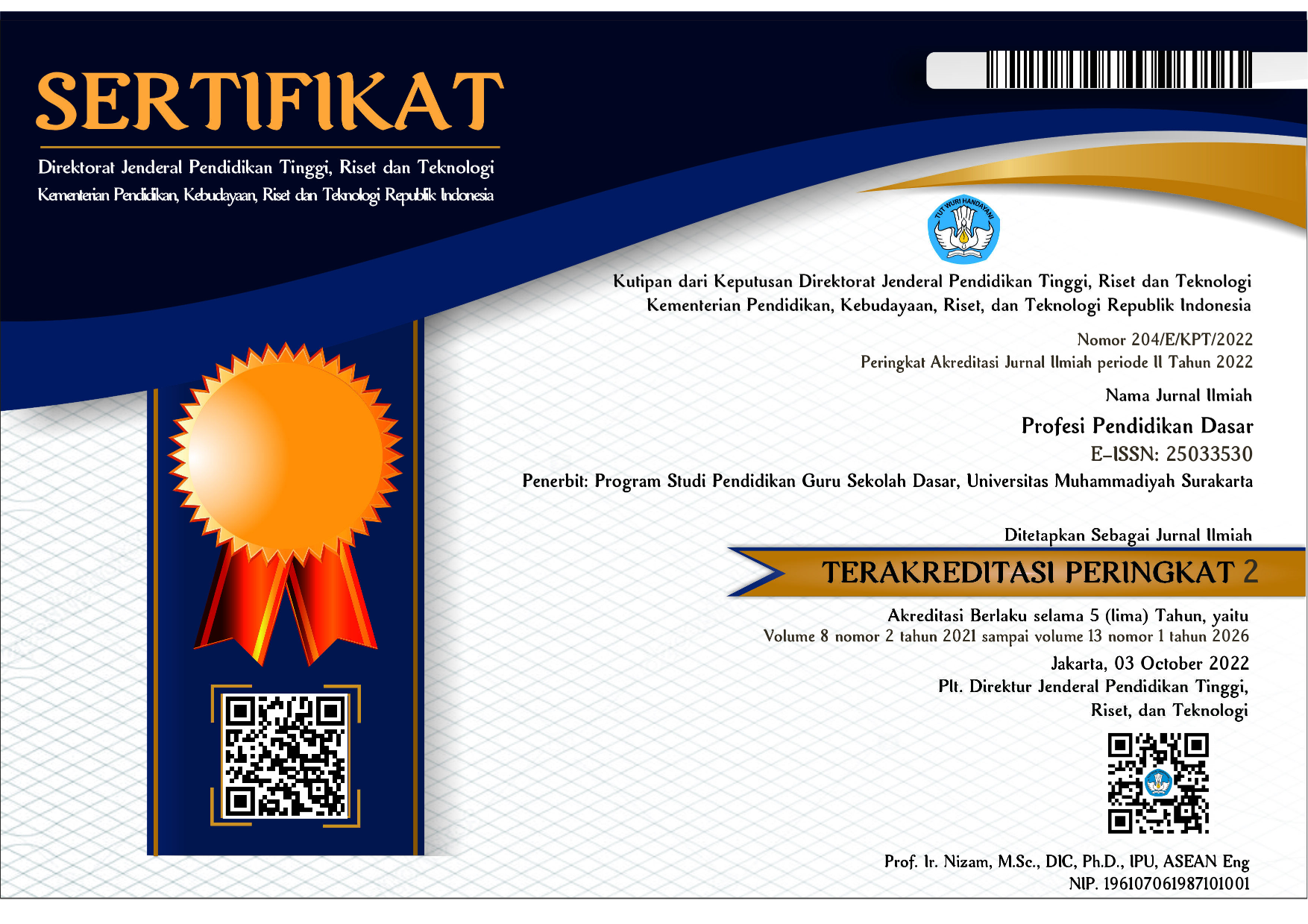STEAM Oriented Science Learning Management During The COVID-19 Pandemic
Mimin Vera Dwi Priyantini(1*), Bambang Sumardjoko(2), Choiriyah Widyasari(3), Yulia Maftuhah Hidayati(4)(1) Universitas Muhammadiyah Surakarta
(2) Universitas Muhammadiyah Surakarta
(3) Universitas Muhammadiyah Surakarta
(4) Universitas Muhammadiyah Surakarta
(*) Corresponding Author
Abstract
Keywords
Full Text:
PDFReferences
Adriyawati, Utomo, E., Rahmawati, Y., & Mardiah, A. (2020). Steam-project-based learning integration to improve elementary school students’ scientific literacy on alternative energy learning. Universal Journal of Educational Research, 8(5), 1863–1873. https://doi.org/10.13189/ujer.2020.080523
Bahri, S., & Budiyono, F. (2020). Pembelajaran Daring Pada Masa Covid-19 di Kecamatan Kalianget. September, 62–66.
Billiark, K., Hubelbank, J., Oliva, T., & Camesano, T. (2014). Teaching STEM by design. Advances in Engineering Education, 4(1), 1–21.
Busa, Y., Agusriandi, A., Elihami, E., & Mutmainnah, M. (2020). Facing Covid-19 in Indonesia: Variations of Learning Media and Online Teaching Learning Through You Tube and Zoom Application. Journal of Critical Reviews, 7(19), 7427–7432.
Daheri, M., Juliana, J., Deriwanto, D., & Amda, A. D. (2020). Efektifitas WhatsApp sebagai Media Belajar Daring. Jurnal Basicedu, 4(4), 775–783. https://doi.org/10.31004/basicedu.v4i4.445
Daugherty, M. K., Carter, V., & Swagerty, L. (2014). Elementary STEM Education: The Future for Technology and Engineering Education? Journal of STEM Teacher Education, 49(1). https://doi.org/10.30707/jste49.1daugherty
Farwati, R., Permanasari, A., Firman, H., & Suhery, T. (2017). Integrasi Problem Based Learning dalam STEM education berorientasi pada aktualisasi literasi lingkungan dan kreativitas. Prosiding Seminar Nasional Pendidikan IPA, 198–206.
Iolanessa, L., Kaniawati, I., & Nugraha, M. G. (2020). Pengaruh Model Problem Based Learning ( Pbl ) Menggunakan Pendekatan Stem Dalam Meningkatkan Keterampilan Pemecahan Masalah Siswa Smp. Wahana Pendidikan Fisika, 5(1), 113–117.
Kemdikbud RI. (2020). Panduan Pembelajaran Jarak Jauh. Kementrian Pendidikan Dan Kebudayaan, 021, 28. https://bersamahadapikorona.kemdikbud.go.id/panduan-pembelajaran-jarak-jauh/
Khaira, N. (2018). Pengaruh Pembelajaran STEM Terhadap Peserta Didik pada Pembelajaran IPA. Seminar Nasional MIPA IV, 233–237.
Kim, Y., & Park, N. (2012). The effect of STEAM education on elementary school Student ’ s Creativity Improvement * Mechanical Mechanism of Rube Goldberg Machine Contest. Computer Applications for Security, Control and System Engineering, 115–121.
Kumar, D. D. (2016). Analysis of an Interactive Technology Supported Problem-Based Learning STEM Project Using Selected Learning Sciences Interest Areas (SLSIA). International Journal of Education in Mathematics, Science and Technology, 5(1), 53. https://doi.org/10.18404/ijemst.69590
Laforce, M., Noble, E., & Blackwell, C. (2017). Problem-based learning (PBL) and student interest in STEM careers: The roles of motivation and ability beliefs. Education Sciences, 7(4). https://doi.org/10.3390/educsci7040092
Melati, L. T., Warsono, & Toto. (2019). Pengaruh model problem based learning berbasis STEM terhadap penguasaan konsep dan kemampuan berpikir kritis siswa. Bioed: Jurnal Pendidikan Biologi, 7(2).
Miles, M. B. (1994). Qualitatif Data Analysis (3rd ed.). SAGE Publications.
Muhamad, S. V. (2021). Pandemi Covid-19 sebagai Persoalan Serius Banyak Negara di Dunia.
Munawar, M., Roshayanti, F., & Sugiyanti, S. (2019). IMPLEMENTATION OF STEAM (Science Technology Engineering Art Mathematics) - BASED EARLY CHILDHOOD EDUCATION LEARNING IN SEMARANG CITY. CERIA (Cerdas Energik Responsif Inovatif Adaptif), 2(5), 276. https://doi.org/10.22460/ceria.v2i5.p276-285
Nurhikmayati, I. (2019). Implementasi Steam Dalam. Didactical Mathematics, 1(2), 41–50.
Peserta, C., & Smp, D. (2016). Implementasi Model Susan Loucks-Horsley Terhadap Communication and Collaboration Peserta Didik Smp. Unnes Science Education Journal, 5(1), 1079–1084. https://doi.org/10.15294/usej.v5i1.9565
Purnamasari, I., Handayania, S. S. D., Formen, A., Pd, M., & Da, P. (2020). Stimulasi Keterampilan HOTs dalam PAUD Melalui Pembelajaran STEAM. 2008.
Sari, R.P., Tusyantari, N.B., & Suswandari, M. (2021). DAMPAK PEMBELAJARAN DARING BAGI SISWA SEKOLAH DASAR SELAMA SELAMA COVID-19 Universitas Veteran Bangun Nusantara , Sukoharjo. December 2020. https://doi.org/10.37478/jpm.v2i1.732
Susanti, D., Prasetyo, Z. K., & Retnawati, H. (2020). Analysis of elementary school teachers ’ perspectives on STEM implementation. Jurnal Prima Edukasia, 8(1), 40–50.
Article Metrics
Abstract view(s): 797 time(s)PDF: 563 time(s)
Refbacks
- There are currently no refbacks.


















